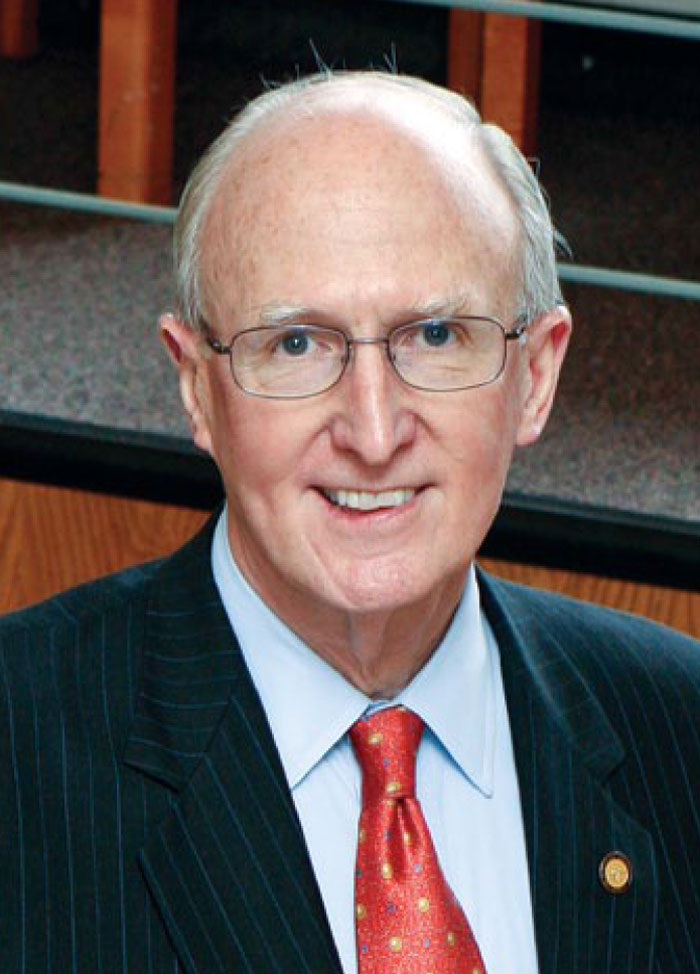Robert A. Scott ’61
I entered Bucknell intending to become a minister, supported by an American Baptist Association scholarship. I was the first in my family to attend college. Over time, I have stayed close to Bucknell, even serving as president of the Alumni Association and a member of the Board of Trustees. On the Board, I met William R. White ’26, who had been Board chair when I was chairman of the Men’s Judicial Board. He remembered my visit to his office on a stormy January day in NYC to protest a decision by President Merle Odgers H’64 that overturned a Judicial Board action.
As a sophomore, I had doubts about why I was in school and whether I could afford to stay.Fortunately, Mildred Martin H’85, my English professor and adviser, talked me into rethinking my decision to leave and urged me to see Dean Charles Meyn about additional scholarship assistance. Together, they helped me determine how I could stay financially and why I should stay intellectually. I have been indebted to them and to Bucknell ever since.
I majored in English and worked in Bertrand Library 20 hours per week, mostly on Saturday afternoons, which meant I could read books on reserve without many interruptions. However, I did not miss out on the evening social life. I remember listening to Johnny Mathis singing “Chances Are” on the jukebox at the Bison and dancing at the Sweet Shoppe.

I ran for elected office each year and served on the Swartz Hall Council, Men’s Judicial Board and as class president. I became a resident adviser and then head resident, all responsibilities that added to the “well” of experience upon which I still draw.
I have fond memories of classes with Martin, Karl Patten, Harold Miller and Hans Wagner. I studied religion with Mark Ebersole and was his student assistant. I became dedicated to a life of learning, and came to understand the importance of questions and of writing as a vehicle for communicating ideas. Bucknell helped me formulate principles about liberal arts education that lasted and guided my later decisions as a college dean and a president.
After graduation, I worked at Procter & Gamble for 18 months, then spent two years on active duty in the Navy. Following my service, I called Bucknell to ask if an admissions job was open, and spent two wonderful years learning from Fitz Walling ’46, P’79, G’05, G’11.
During my first year, I asked Fitz why some students accepted our offer of admission and others didn’t. That question led to research, my first two professional publications and an invitation to attend the Harvard Summer Institute. In my class was an associate dean at Cornell, who asked me to exchange “Buck” for “Corn.” My wife and I moved to Ithaca, N.Y., where I earned my Ph.D. and started writing in earnest.
In 1976, Bucknell President Dennis O’Brien invited me to be his vice president for development, but I decided to join the Indiana Commission of Higher Education instead. It was there that I met Gary Sojka. Imagine our surprise a few years later when, as president of Ramapo College of New Jersey, I marched in Gary’s inauguration as president of Bucknell.
Bucknell was a starting point for me in many ways. My “well” of experience was enriched by the opportunities and challenges it provided. I am the better for it.
Robert A. Scott ’61 held the top three posts in American higher education: president of a private university, Adelphi (2000-15); a public institution, Ramapo College of New Jersey (1985-2000); and a statewide higher education coordinating board, New Jersey (1994) and the Indiana Commission on Higher Education (1979-85). He is the author, editor or contributor to 18 books, most recently How University Boards Work, 2018. In 1991, he received Bucknell’s Alumni Award for Outstanding Achievement in a Chosen Profession.